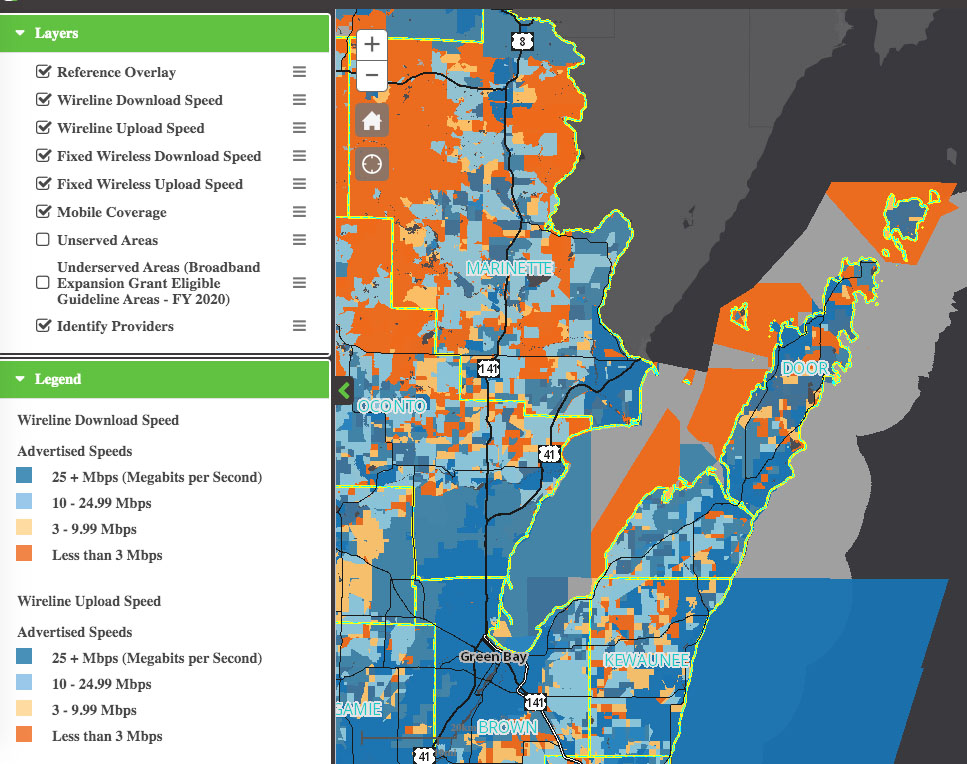Amendments to Tower Ordinance Head to Public Hearing
- Share
- Tweet
- Pin
- Share
The changes don’t go far enough for those who want fixed wireless broadband towers to be exempt from all regulations

The Door County Resource Planning Committee (RPC) will take public comment on changes designed to reduce some regulations on communications towers.
The virtual public hearing scheduled for June 4, 1 pm, proposes to amend, specifically, Chapter 14 of the county’s zoning ordinance, which covers regulations for the siting and construction of communications support structures and related facilities such as cell towers, radio towers and broadband towers, including fixed wireless broadband towers. The amendments remove regulatory exemptions for towers of 50 feet or shorter, allows neighbors to waive setbacks, clarifies compliance with federal regulations, and changes certain licensing and bonding requirements.
When the RPC voted May 7 to schedule the public hearing, the committee indicated the amendments “will likely not satisfy all interested parties, but are a good-faith first step,” according to the meeting minutes.
The minutes were correct. Some of the interested parties do not believe the amendments go far enough to create opportunities for better broadband access across the peninsula, particularly for fixed wireless broadband. The technology has towers that are shorter than 200 feet, with equipment that delivers line-of-sight service through radio waves, providing high-speed internet connection without using phone or cable lines.
“If the RPC wants to do something simple to address the problem right now, they should exempt fixed wireless broadband towers shorter than 200 feet tall from the ordinance,” said David Studebaker, who has been beating a drum for a decade for better internet access in Door County.
He first joined the Liberty Grove Technology Committee in 2010 and several years ago became a member of the Door County Economic Development Corporation’s (DCEDC) technology committee, which is working on better internet access for the whole county.
The problem, Studebaker said, is that broadband access for some is not fast enough, reliable enough or affordable enough, depending on where they live. Others in Door County have no access at all.
“Without it, we are reducing quality of life and limiting options for economic development, eventually endangering the county’s economic health,” Studebaker said.
But total exemption for fixed wireless towers is not one of the changes the RPC is considering.
“The basic fact that they want to be exempt is a stumbling block,” said Mariah Goode, director of Door County Land Use Services.
The proposed changes came about following meetings last year between county staff and the DCEDC’s technology committee.
“They approached the county about the constraints the ordinance put on broadband expansion,” Goode said.
Through discussions with all of the interested parties, county staff developed the suggested changes. But they don’t appease all parties for two primary reasons.
First, fixed wireless towers are not like other communications towers, being “much shorter in height, much narrower in diameter, and [they] carry a significantly lighter wind load than mobile towers,” according to Kevin Voss, who owns Baileys Harbor-based Door County Broadband (DCB) with his wife, Pam.
The county’s current ordinance, however, treats all communications towers the same.
“Calling a tower a tower is like calling a plane a plane or a pilot a pilot,” Kevin Voss said.
Second, because the towers are treated the same, Voss said the regulatory costs the ordinance imposes make it financially prohibitive for him to construct a tower under the county’s ordinance. He said he doesn’t know exactly how much the regulations cost because he hasn’t built a tower in Door County where it’s governed by the county’s zoning ordinance since that ordinance changed in 2015. And yet DCB is the only company currently providing wireless broadband service in Door County.
Regulatory exemption for the types of towers Voss constructs used to be exempt under county zoning. That changed in 2015 when the Door County Board of Supervisors amended its ordinance in keeping with new regulations for communications towers adopted by the state. Voss lobbied against those changes, to no avail.
State law allows towns to opt out of the county’s existing ordinance to develop their own tower ordinances. The town ordinance then applies, not the county’s. Five of Door County’s 14 towns – Baileys Harbor, Egg Harbor, Jacksonport, Liberty Grove and Nasewaupee – have already done this, and Gibraltar is expected to as well. That leaves eight towns that follow county zoning. And in those eight towns, Voss said he cannot build new towers due to the county’s restrictions.
The opt-out has made a difference in Liberty Grove, Studebaker said, where several DCB towers are constructed annually.
“Slowly, but surely, more of Liberty Grove’s residents are getting access to better internet services,” Studebaker said. “It’s still a long-term process, but some progress is a lot better than none.”
Though the issue with the Door County ordinance pertains to towers, Voss said his is a broadband company, not a tower company, and his staff is able to install transmission equipment on existing structures such as mobile towers and silos. DCB is also expanding into Kewaunee County, where regulatory costs don’t prohibit tower construction.
“We’re on six silos in Kewaunee [County] and getting ready to put up a tower down there,” he said. “So from our end, this whole thing comes down to, if you don’t want internet, that’s fine.”

